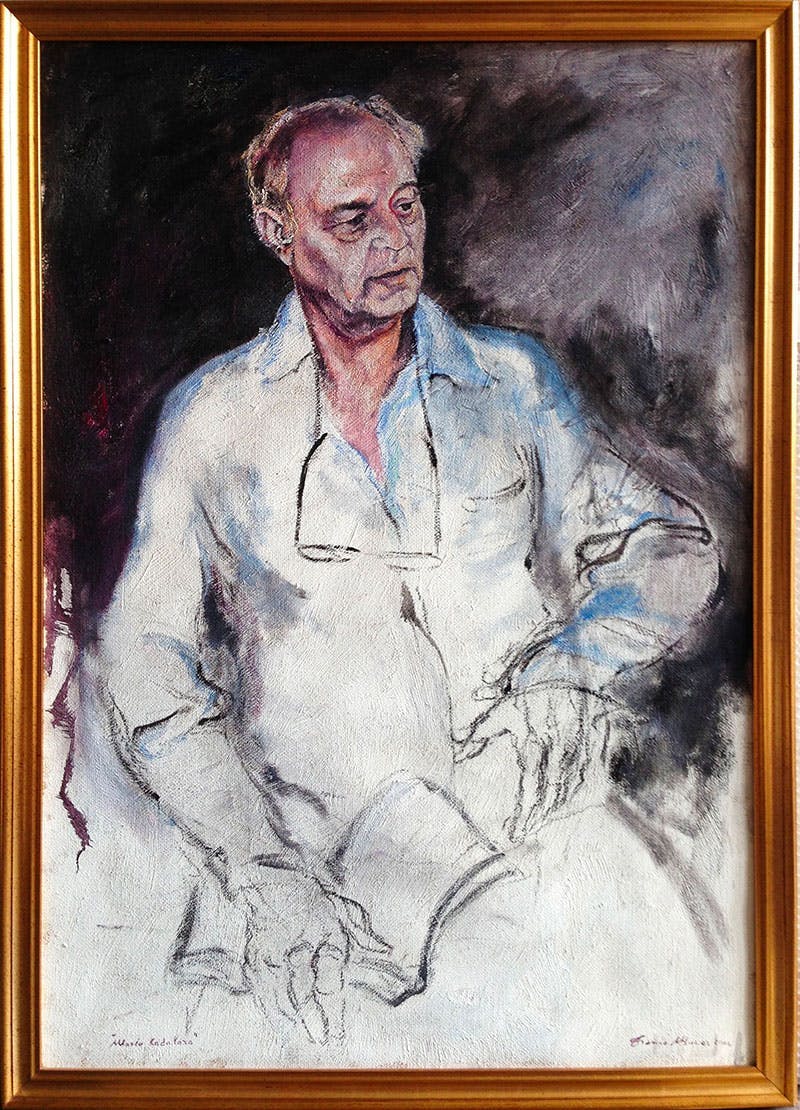
My name is Nicola, and my grandfather was Mario Cadalora. When he wrote this letter to me, I was still too young and immature to understand how much love moved the pen that traced on paper the truthful and intensely sweet story of a whole life, his life.
And now, twenty years later, my hands are moving clumsily on the keyboard, once again guided by love, to tell you about the life of a man who lived for art and whose ever kind eyes always sought the beauty within every human being.
This is his story
Mario Cadalora was born in Mantua on March 29, 1928.
His father was Giuseppe, a train driver working for Ferrovie dello Stato, the Italian national railway system. Giuseppe was, above all, a socialist, animated by ideals of brotherhood and solidarity in a time when everything that deviated from fascist ideology was dangerous and outlawed.
His mother Rina was the young seamstress of the town’s gentry. She died at 33, leaving a void that Mario would never be able to fill.
His childhood was marked by loneliness, separation from his siblings and his birthplace. The family, or what remained of it, had to move away, first from Gonzaga to Modena and then all the way to Sardinia, in order to escape the violence of the local fascists.
Sant’Antioco and Sardinia would shape the geography of his memories: the beaches, the scent of figs, the fish caught with his hands, the long and dark Good Friday processions were the images that resurfaced in the stories and poems of my grandfather.
The ideals
When the war started to draw to a close, the family returned to Gonzaga. Barely more than a child, Mario participated in sabotage and disruptive actions to hinder the Nazi occupation.
Despite the danger and fear, those were the years of his political development. It is from those experiences that Mario nurtured ideals of non-violence and a deep love for freedom of expression.
“Always believing you are right is the most wrong thing in the world. Only when you open your mind you have a chance to hear unexpectedly interesting ideas. And beautiful. "
Doubt was my grandfather’s compass: an instrument aimed at never losing a connection with othes. Questioning his own certainties, putting them to the test by constantly confronting with people who held positions possibly opposite to his, allowed him to always keep a window open on a wider world of ideas, hopes and visions. Dialogue, to my grandfather, was the stone on which a participatory and harmonious society was built.
Social commitment
In 1954 he joined the Italian Communist Party (PCI). Despite his doubts about an ideology that placed the individual and his peculiar uniqueness in the background, he became a party official.
It was a time of great turmoil. Important cultural circles were born, such as the Circolo Formiggini of which Mario became Secretary. The circle was born on the initiative of a group of left-wing intellectuals from the Italian Socialist Party PSI and the Italian Communist Party PCI, but independent from party directives.
The convergence of intellectuals from different ideological backgrounds gave rise to bitter internal conflicts, but also contributed to making the circle a true cultural laboratory.
In 1957 Mario became Secretary of the Casa della Gioventù (Youth House) and decided to open the first secular after-school program in Modena, making it possible for young people to access a library, a gym, outdoor spaces, and, above all, a cinema and a theater.
"Sow the love for art in a child and you will raise a better citizen."
Love for art
The 1950s were about to give way to the 1960s. My grandfather was a thirty year old man, full of ideas and tireless in years when the country was living a dream of rebirth.
On February 8, 1959, with an exhibition of the painter Rino Golinelli, he founded the Sala di Cultura, which in 1974 became Modena’s Civic Gallery.
In the same period, with the 30,000 lire he received as severance from Casa della Gioventù, he opened the first private art gallery in Modena. La Sfera was born.
The gallery immediately became a place for encounter and experimentation. Mario invited unknown but promising young artists to exhibit their works. Many of those young people would become great painters of that time: Concetto Pozzati, Ennio Calabra ...
Theater
At the age of 33 he became Director of Modena’s municipal theater. Before accepting the role he placed a condition: not to be a party candidate, but a shared candidate. The city council elected him unanimously.
The theater was for my grandfather the perfect instrument to open a dialogue between social classes. History proved him right: within a few years theater members reached 4500, spanning form upper class to members of PCI and PSI. Everyone was attracted to a program that brought to Modena artists such as Emanuele Riva, Carmelo Bene, Biancardi, Cesare Maestri, Mario Scaccia.
Soon he was entrusted with coordinating the programs of ATER, the Emilia Romagna association of theaters. He began by coordinating opera productions between traditional theaters, but soon the desire to experiment pushed him to program dramas with ambitious productions and reviews.
At this point of the story my memory begins to blur. I know of a close collaboration with Giorgio Strehler, I remember he traveled to and from Milan. For the rest I am trying to reconstruct a timeline, starting from the stories, comparing them with the letters and the books my grandfather left me.
I have lost a lot since he was gone, but at the age of twenty I knew nothing of the nostalgia that now brings me to follow small clues, begging for crumbs of memories from those who knew my grandfather and shared some life with him.